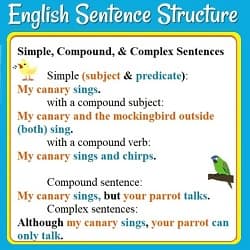English Verb Tenses
English verb tenses are about time-- when things happened or will happen. The basic tenses are the past, the present and the future (with will and be-going-to +).
Each of these basic tenses has a simple form, a continuous (or progressive) form, and a perfect form. There are also combinations like the present perfect continuous tense. The present perfect tense is actually more about the past than the present.
We also have four conditional tenses in English for what would be (or would have been) true under certain conditions (if...)
Continuous tenses show that something is ongoing. They use forms of ‘be’ as a helping verb, while the main verb is in the present participle form (ending in -ing.) See all the tenses of the Verb to Be here.
Examples:
- Bill was studying for a test Friday.
- Mom and I are hurrying.
- I will be leaving at 10.
Perfect tenses in English use forms of ‘have’ and a past participle. (Most past participles have the same form as the simple past tense, but there are important irregular forms. See Past and Present Perfect Tense Use for a list of irregular past participles that are different from the simple past forms. See also a complete list in Irregular Past Participles.)
Examples:
- Joe had hoped to go to Harvard, but he went to MIT instead.
- Ellen has always worked hard.
- She will have studied medicine for over ten years before she becomes a doctor.
English Verb Tenses: The Past
Examples of the Simple Past Tense:
- Yesterday Mark got up early. He ate breakfast, then took the bus to work. He worked all day, then came home, cooked and ate dinner, listened to some music, and went to bed.
We use the Past Continuous Tense for something that was going on when another event happened.
Examples the Past Continuous:
- Mark was still thinking about the day's events when his girl friend called.
- When the phone rang, he was getting ready for bed.
Another way to show that something continued over a long period of time is with 'used to' + the base form of the verb. Examples:
- He used to go to bed late, but now he goes to bed before 10.
- Beth used to call every evening before supper, but she forgot to call until late that evening.
Mixed Past Perfect Tenses (with a conditional at the end):
· Mark hadn’t been worrying. In fact, he had been too tired to even notice that she hadn’t called. “You should have just sent a text message,” he told her. “I would have called you if I had started to worry.”
For more information on using past tenses in English, see
- Modal Verbs, and
- Modal Practice. (We can use several modals in the past, especially with a perfect tense. We also use most of them in the present. 'Will' is for the future.)
The Present Tenses
The main present tenses in English are the Simple Present and the Present Continuous Tense. Both are very common, but not interchangeable.
We use the Present Continuous to talk about something that is happening right now:
- My husband is singing.
- I’m typing.
- Our friends are eating dinner at home tonight.
- “What are you doing?” -- I’m studying English.*
We can also use the present continuous tense to talk about the future:
- Our daughter is coming to visit us next Tuesday.
The Simple Present is used to talk about the nature of things. It tells the way things always (or never, or often) are, or what we do at certain intervals.
- Dogs eat meat, but cows and horses eat grass. A goat eats almost anything.
- Easter always falls on a Sunday, but the date varies. Thanksgiving is usually the 4th Thursday in November. American independence is always celebrated on July 4th, whatever day of the week it falls on.
- We celebrate other holidays in the U.S. on the Monday closest to the original date. Most people don’t have to work then. People in certain jobs have to work on holidays to keep hospitals and important services open. They get another day off instead.
- Some people keep a regular schedule. They wash their clothes on Mondays, shop on Tuesdays, clean house on Fridays, and often go to the park on Saturdays. Other people prefer variety. They don’t want everything to be the same. So sometimes they clean house on Mondays and sometimes on Fridays...
- I never drink coffee; I don’t like it. I have friends that need to drink several cups a day to feel their best. Some people can “take it or leave it.” They drink it when it’s cold, or for social occasions.
- I live in California. (It’s also common to say “I’m living in California,” but that suggests it’s temporary.) People in California often spend a lot of time outdoors, as the weather is pleasant for much of the year.
- *“What do you do?” --“I’m a teacher” (or “I work in insurance,” or “I’m a student,” or “we’re retired.” Notice that this question means “What kind of work do you do?”)
Modals (see links at the end of the past tense section above) can be used in the present (as in the past or future.) So can the present perfect or present perfect continuous. Both show something that may have begun in the past, but is continuing or may continue. Examples:
· “You should take a vacation. You’ve been working such long hours lately.”
· (Doctor:) “How long have you had this cough?” (Patient: ) “I’ve had it for almost two weeks, since that storm we had. I’ve been getting lots of rest, and drinking tea, but it just won’t go away. Should I have stayed home from work? I might have taken some time off, but I can’t afford much more time off work.”
· “Can you read this for me? I haven’t been able to read fine print since I got that eye infection.”
See also Present Tense Verbs and Practice. (Also see the links for Modals, Modals Practice, and the Present Perfect-- all at the end of the past tense links.)
Tenses Showing the Future
The most common ways to express the future are using ‘will’ or ‘be going to.’
We also use the present continuous with a future day or time (as shown above) or a modal or future perfect.
Examples:
· “He’s going to go to Canada for his next vacation.”
· “Will he take his mother?”
· “Probably not. She’s planning several big projects, and I don’t think she’ll be finished with them before his vacation starts. However, she might join him for the last part of his trip. She will have finished by then.”
For more, see Future Tense Practice.
Review what you need to understand about English sentence structure, question formation, and parts of speech with the links to these grammar lessons.
Do you have questions about English sentence structure? Check out these explanations & examples of the word order for many kinds of sentences (including those with phrases and direct or indirect objects).
You can find useful grammar practice exercises by clicking links on this page.
You might also like Negative Sentences. (It has a funny video and information on contractions. We can use contractions with any of these tenses in informal speech or writing. See English Contractions.)
Didn't find what you
needed? Explain what you want in the search box below.
(For example, cognates, past tense practice, or 'get along with.') Click to see the related pages on EnglishHints.
| site search by freefind | advanced |










